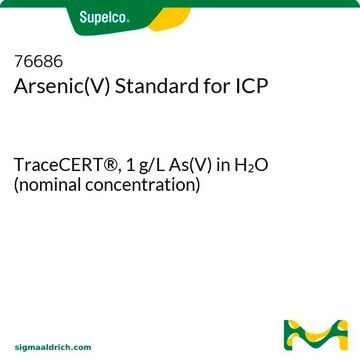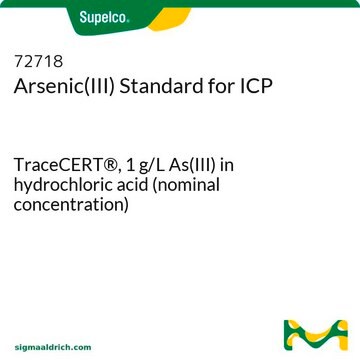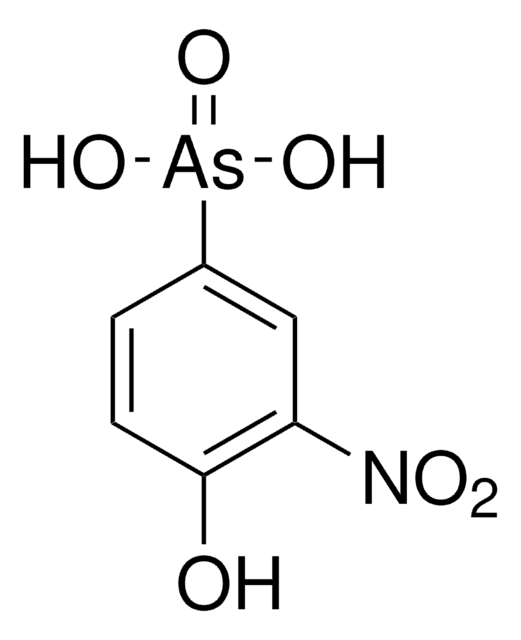11093
Arsenobetaine
purum p.a., ≥95.0% (NMR)
Synonym(s):
2-(Trimethylarsonio)acetate
Sign Into View Organizational & Contract Pricing
All Photos(1)
About This Item
Empirical Formula (Hill Notation):
C5H11AsO2
CAS Number:
Molecular Weight:
178.06
Beilstein:
3933180
MDL number:
UNSPSC Code:
12352100
PubChem Substance ID:
NACRES:
NA.22
Recommended Products
grade
purum p.a.
Quality Level
Assay
≥95.0% (NMR)
form
solid
SMILES string
C[As+](C)(C)CC([O-])=O
InChI
1S/C5H11AsO2/c1-6(2,3)4-5(7)8/h4H2,1-3H3
InChI key
SPTHHTGLGVZZRH-UHFFFAOYSA-N
Looking for similar products? Visit Product Comparison Guide
Application
Arsenobetaine has been used to investigate the biochemical response of mice (Mus musculus) to inorganic arsenic exposure using liver as the target organ.
Packaging
Bottomless glass bottle. Contents are inside inserted fused cone.
Signal Word
Danger
Hazard Statements
Precautionary Statements
Hazard Classifications
Acute Tox. 3 Inhalation - Acute Tox. 3 Oral - Aquatic Acute 1 - Aquatic Chronic 1
Storage Class Code
6.1C - Combustible acute toxic Cat.3 / toxic compounds or compounds which causing chronic effects
WGK
WGK 3
Flash Point(F)
Not applicable
Flash Point(C)
Not applicable
Personal Protective Equipment
dust mask type N95 (US), Eyeshields, Gloves
Choose from one of the most recent versions:
Already Own This Product?
Find documentation for the products that you have recently purchased in the Document Library.
Customers Also Viewed
Mojtaba S Taleshi et al.
Environmental science & technology, 44(4), 1478-1483 (2010-01-27)
Arsenic occurs naturally in many types of seafood as water- and fat-soluble organoarsenic compounds. Although water-soluble compounds have been well characterized, the fat-soluble compounds, so-called arsenolipids, have until recently remained unknown. We report that sashimi-grade tuna fish, with a total
R Alborough et al.
Scientific reports, 10(1), 3160-3160 (2020-02-23)
Felids have a high incidence of chronic kidney disease (CKD), for which the most common renal lesion is chronic interstitial nephritis (CIN). CIN can be induced by tissue oxidative stress, which is determined by the cellular balance of pro- and
Jörg Feldmann et al.
Analytical and bioanalytical chemistry, 399(5), 1735-1741 (2010-10-26)
In this opinion paper the toxicokinetic behaviour of arsenosugars is reviewed and compared with that of inorganic arsenic and arsenobetaine. It is concluded that the arsenosugars are similar to inorganic arsenic in terms of metabolite formation and tissue accumulation. As
Mark Button et al.
Environmental geochemistry and health, 42(9), 2723-2732 (2020-01-04)
Uptake, distribution and speciation of arsenic (As) were determined in the bracket fungus Fomitopsis betulina (previously Piptoporus betulinus), commonly known as the birch polypore, collected from a woodland adjacent to a highly contaminated former mine in the Southwest UK and
Weisheng Wang et al.
Environmental science and pollution research international, 26(24), 24372-24379 (2019-06-24)
The Eucalyptus cultivation acreage was large in Guangxi provinces. Guanglin 9 (Eucalyptus grandis × Eucalyptus urophylla) is a widely cultivated Eucalyptus species and has been found to grow normally in soils contaminated by heavy metals such as arsenic (As), but
Our team of scientists has experience in all areas of research including Life Science, Material Science, Chemical Synthesis, Chromatography, Analytical and many others.
Contact Technical Service












